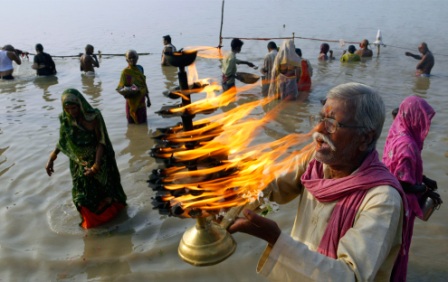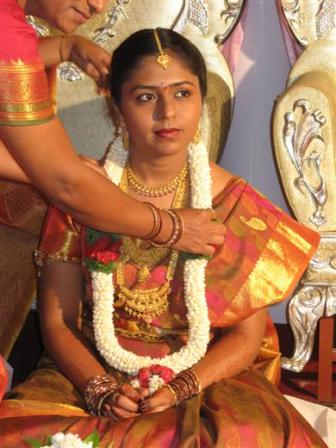|
restoring our biblical and constitutional foundations
|
Looking at Hinduism
Have you ever taken a road trip? What’s the first thing you decide? Where to go! Even if all you plan to do is drive around and return back home, you’ve decided where to go.
Then you plot the way of getting there. You submit yourself to the truth of a map. If the map says “Turn right on Hwy 735”, then you turn right onto Hwy 735.
Finally, you accept the reality of the limitations of your vehicle. You know that if the tires are worn, you better have a spare one. You accept that your vehicle will not run if there is no gas in the tank.

As I’ve studied Hinduism, it seems to me that those who believe in this system of philosophies are taking road trip to an unknown destination, they have no authoritative plan to get there, and they deny the limitations that accompany humanity. Furthermore, they know that if they don’t get to wherever they are supposed to get to before the end of their life, then they have to start all over again in a new life.
Judaism can point to the escape from Egyptian bondage in about 1300 BC, Christianity can point to Jesus Christ in the year 33AD, Islam can point to Mohammed in the early 7th century AD, but there is no single person or year that indicates the origin of Hinduism. It is a sort of ‘coming together’ of different philosophical views rather than a fixed set of beliefs. Because its origins are so distant and vague sometimes it is called the “oldest living religion.” The name “Hindu” is a reference to the people living across the Indus River, which begins in the highlands of Tibet and flows through northern India and down through Pakistan; it is the name foreigners gave to the Indian people. Whereas other major religions may have several “branches” or variations, Hinduism takes diversity to a new high with thousands of variations.

Buddhism (which developed about 500 years before Christ lived on earth), grew up side by side with Hinduism….each influencing the other in the development of deities, rituals and philosophies. As it is today, here are the basic ideas of Hinduism….
- Karma. This is the idea that action and reaction are opposite and equal. This means that for every choice I make today, there was something in my past, or there is something in my future, that is equal and opposite. All of Life is connected. It’s not only connected, it’s repetitive (circular). So following the end of the current life comes life in another form and the choices of this life affect the events of the next life. This is one of the teachings of Hinduism that breeds such hopelessness. Its followers cannot point to exactly what they did in a past life that is responsible for their horrible state in this life (so they cannot learn from it), but they are certain that whatever it was it justifies their situation today. So, in a sense, they feel that they brought bad things on themselves by their choices in a previous life.
- Freedom of belief. Since Hinduism is at its core a synthesis, a conglomeration of various belief systems, supposedly there is a great tolerance of other belief systems. Certainly some Hindu leaders (like Gandhi) were peace-lovers. However, this toleration has a limit. Some Hindus have shown religious violence against other religions. And some say that Hindu nationalists present the greatest challenge to Christians, far more than extreme Islamists. A simple reading of the news reflects horrible atrocities done Hindu against Hindu. The tolerance of Hinduism seems to stop where personal desire starts.
- Man’s primary purpose. Hinduism teaches that man’s primary purpose is the realization of his oneness with the god, the ultimate Brahman, the source of all things. And it teaches that all of man’s problems come when he fails to connect to this oneness. How does a good Hindu connect with God? Through developing his inner spiritual life, that spiritual essence within, so that wisdom, peace, joy and harmony flow against the current of the material world. How the Hindu defines his god varies greatly. Basically, they can choose whatever god-form they want. Listen to how one Hindu described his Hindu religion: Hinduism does not dictate what a person should think about God, that is considered a personal view, 'Mata' (opinion) or 'Pantha' (road). That is why Hindus may be polytheists, monotheists, monists, or even atheists. Even in one family, persons may hold different views. In my family, I am an atheist, but all others are polytheists….Each creature is free to choose his own path. All creatures take several births, depending on his effort, until they understand GOD and they merge with HIM. A Hindu teacher described the god of Hinduism like this: Hinduism believes that there is only one supreme Absolute called "Brahman". However, it does not advocate the worship of any one particular deity. The gods and goddesses of Hinduism amount to thousands or even millions, all representing the many aspects of Brahman. Therefore, this faith is characterized by the multiplicity of deities. The most fundamental of Hindu deities is the Trinity of Brahma, Vishnu and Shiva - creator, preserver and destroyer respectively. Hindus also worship spirits, trees, animals and even planets.
This sounds like the people at the Areopagus in Athens! Paul preached to them about their “unknown god”..the one true God, Jesus Christ..in Acts 17:22-31: “Men of Athens! I see that in every way you are very religious. For as I walked around and looked carefully at your objects of worship, I even found an altar with this inscription: to an unknown god. Now what you worship as something unknown I am going to proclaim to you. The God who made the world and everything in it is the Lord of heaven and earth and does not live in temples built by hands. And he is not served by human hands, as if he needed anything, because he himself gives all men life and breath and everything else. From one man he made every nation of men, that they should inhabit the whole earth; and he determined the times set for them and the exact places where they should live. God did this so that men would seek him and perhaps reach out for him and find him, though he is not far from each one of us. ‘For in him we live and move and have our being.’ As some of your own poets have said, ‘We are his offspring.’ Therefore since we are God’s offspring, we should not think that the divine being is like gold or silver or stone—an image made by man’s design and skill. In the past God overlooked such ignorance, but now he commands all people everywhere to repent. For he has set a day when he will judge the world with justice by the man he has appointed. He has given proof of this to all men by raising him from the dead.”
- Sin. In Hinduism, sin is not the breaking of a firm moral code (as with Islam and Christianity). Rather it is any action or thought or value that disrupts the harmony and peace between living things. And ancient Hindu sage explained: In the eighteen puranas of Vedavyasa, two sentences are important: To help others is merit, sin is to trouble others. Social calm is very important in Hindu culture. For this reason the caste system was developed; every person had a place in society, and each was to move only within his particular sphere. Submission to the caste system of social order has spiritual repercussions. “Sin” is refusal to comply with social order. Hence, there is much peer pressure and intimidation in the Hindu culture. Hinduism is a way of life dominated by a conglomeration of philosophies. Only today is the concept of individual rights, of women’s dignity, and of children’s needs beginning to be recognized.
To summarize and compare the religion of Hinduism with Truth as we know it in the Scriptures…
- There is no absolute sin or moral code in Hinduism; anything that disrupts is a “sin”. The idea of God being absolute righteousness and man being born in a depraved (sinful) condition is foreign to this religion. It does not share our concept of sin with a price tag. The need for a Savior is a new idea to them. Though they try to remove the concept of absolute sin from their conscience, the Scriptures say that God has placed this awareness in every human being. Read Romans 1:16-23…”I am not ashamed of the gospel, because it is the power of God for the salvation of everyone who believes: first for the Jew, then for the Gentile. For in the gospel a righteousness from God is revealed, a righteousness that is by faith from first to last, just as it is written: “The righteous will live by faith.” The wrath of God is being revealed from heaven against all the godlessness and wickedness of men who suppress the truth by their wickedness, since what may be known about God is plain to them, because God has made it plain to them. For since the creation of the world God’s invisible qualities—his eternal power and divine nature—have been clearly seen, being understood from what has been made, so that men are without excuse. For although they knew God, they neither glorified him as God nor gave thanks to him, but their thinking became futile and their foolish hearts were darkened. Although they claimed to be wise, they became fools and exchanged the glory of the immortal God for images made to look like mortal man and birds and animals and reptiles.
So Hindus are not looking for a release from the burden of their sin through a Savior, or Messiah, or a Prophet. Hindus wash in the River Ganges, they mutilate their bodies, they revel in pleasures….trying to always connect with their self-described god, but never coming to the full knowledge of the Truth. Who will tell them of the Savior?

- Any form of spirituality is OK in Hinduism….as long as it doesn’t disrupt society. Each person can concoct their own god and find their own way to experience their god. Ultimately everyone’s god is part of the one great god. The Scriptures teach us, however, that Truth is absolute; it does not change from person to person, nor from generation to generation. The Word of the Lord lasts forever. If we reject that Truth and make our own laws, each person doing what is right in their own eyes, there is a great price to be paid. God is not mocked; whatever a man sows is what he will reap. When he sows rejection of the Truth, he will reap destruction. Can God be God if he is simply a concoction of man’s desire and imagination?
- Hinduism teaches that resident in each creature is a speck of god, and his purpose in life is to have a fuller realization, a greater connection with this god. If that connection cannot happen in one lifetime, then it requires a 2nd lifetime, and a 3rd, and a 4th, ad infinitum. The creature will continue to have re-births until he connects adequately with the god, and is then launched into Nirvana (heavenly bliss and freedom). The burden of connection rests with the creature. Yoga, meditation, chants, rituals…anything is allowed if it helps the creature to connect with his god. In Hindu temples this could even include the ownership of young girls and boys. Amy Carmichael’s ministry was largely to rescuing these innocent lives from these things.

Can you see the hopelessness of Hinduism? Can you see the failure to deal with the sin nature of man? Hinduism is largely a philosophical matter, a playing with the mind, an adjusting of spiritual realities to fit individual desires.
Though Hinduism has been strong in the regions of India for thousands of years, it did not come to the USA until the 1960s. During this time in our history, our young people were looking to overthrow the restraints of society. They did not like “the establishment”. They did not want restrictions on relationships with the opposite sex. They discovered the ‘liberating’ highs of drugs brought back from Vietnam. And to go with all this so-called freedom, they looked to Hinduism as a viable religion for them. Today you can find Hindu temples scattered across our country. But there is a country where about 80% of the population is locked into the hopelessness of a vague collection of philosophies, searching for a god of their own making, never knowing how to find him, and knowing that their spiritual life will go in circles for generations if they fail to merge with him. In recent weeks 10 million of these precious souls came together at the River Ganges to bathe as a spiritual exercise in their attempt to merge with their gods.
Who will introduce them to the God who became Man in order to be man’s mediator? Who will show them the way off their spiritual treadmill? Who will lead them to the only successful Treatment for the ache in their souls, an ache that comes from sin in the true concept of it?

How many minutes did it take you to read this article? It took me 7 minutes. During the time it took me to read this article, 238 new babies were born into a Hindu family in India….and 70 people following Hinduism in India passed into eternity without a Savior.
(Next report: the Peniel Gospel Team.)
February 10, 2013